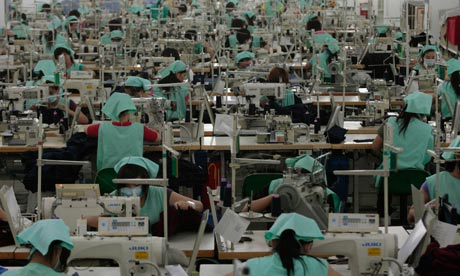Illnesses contracted in factories in Cambodia, China, India,
Indonesia, the Philippines and Thailand 'ignored and unreported'
“Cambodia has no laws on occupational safety and so produces no figures”
Vaudine England in Hong Kong
guardian.co.uk, Thursday 26 April 2012
 |
| Workers operate sewing machines at a factory in southern China. Asia Monitor Resource Centre wants to improve the lot of 'invisible victims of development'. Photograph: Siu Chiu/Reuters |
Millions of Asian people are contracting fatal diseases at
work but their suffering is ignored, unreported and uncompensated, according to
a new report by a labour rights group.
Asia Monitor Resource Centre (AMRC) says poisoning in
unhealthy workplaces is creating untold numbers of "invisible victims of
development".
The group's report on health and safety in six countries –
Cambodia, China, India, Indonesia, the Philippines and Thailand – has been issued
ahead of International Workers Mourning Day on Saturday.
The International Labour Organisation has estimated that 1.1
million people in Asia died due to their work in 2008.
But official figures rarely cover deaths of migrant workers
and thus the true total is much higher, said AMRC executive director Sanjiv
Pandita.
Cambodia has no laws on occupational safety and so produces
no figures. The Philippines, a country of almost 100 million people, reported
just 118 deaths in one year and only offers numbers for every fourth year.
India reported fewer than 1,000 fatal accidents in one year.
Thailand reported 597 deaths but noted the number included deaths from
insurgency. China reported 80,000 fatalities but that figure included traffic
accidents.
Behind the numbers are human tragedies.
Ramesh Makwana has silicosis, an incurable disease routinely
misdiagnosed as tuberculosis, in which fine dust settles in the lungs.
He contracted this by joining the main industry in his
village in Gujarat, India – the cutting and polishing of gems.
"First it kills the men," he said. "Then the
disease kills the women who are forced to take over the work to survive, and
finally it takes our children.
"If you're in this job now, you cannot ever get married
any more – the girls know you will be dead in your 30s. No one will carry on
your name."
Wang Fung-ping from southern China suffered kidney failure
from cadmium poisoning after working in a factory making batteries.
It took her seven years to get diagnosed – but the official
doctors have still not recognised her case as one of occupational disease. No
treatment or compensation has been forthcoming.
Xiao Hong is another victim of the battery factories. The
former supervisor has now been diagnosed as suffering excessive cadmium levels.
"I worked in the battery factory for 15 years and from
about the third year, you start to feel it – the sore throat, nose infections,
dizziness, headaches," she said.
"No one ever told us what the risks were, what could
happen. At our workplace you could see pink cadmium powder everywhere – workers
would faint at work but think it was their own problem."

-800.jpg)
No comments:
Post a Comment